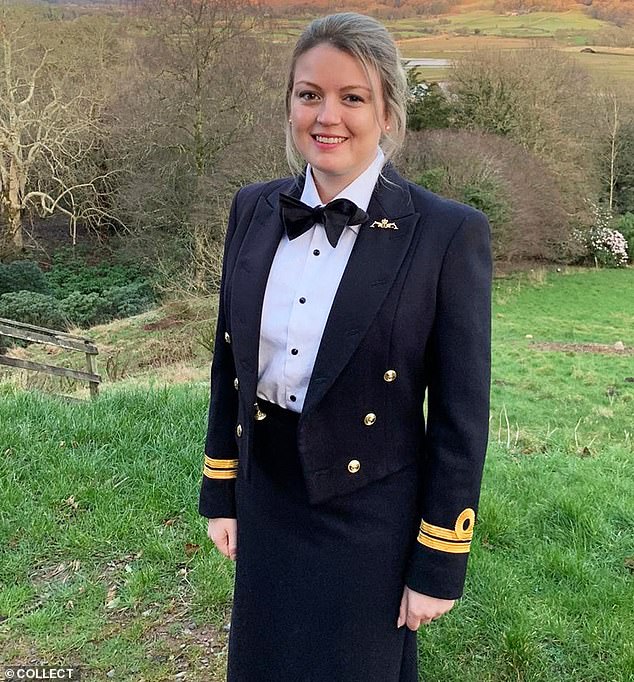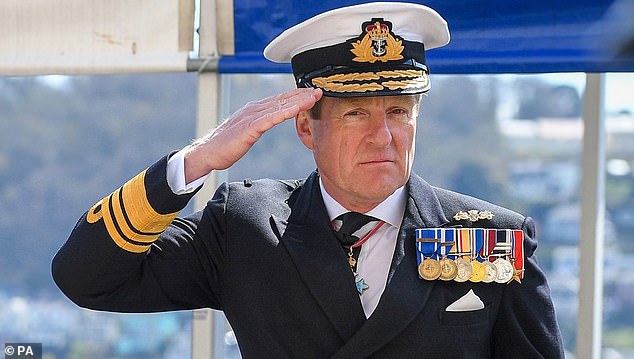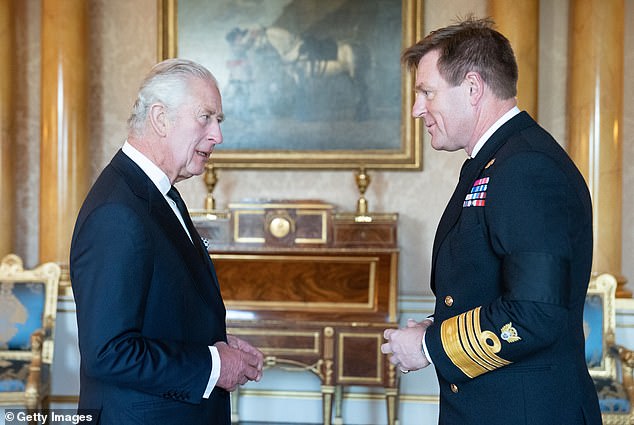For more than a century, the Royal Navy’s submarine service has operated behind a thick curtain of secrecy – a shadowy world of steel corridors and sonar silence, where power is absolute, scrutiny seemingly minimal and those in command are lionised as guardians of our country’s deadliest weapons.
But now, that carefully curated image is unravelling as the elite service faces perhaps its most damning reckoning yet.
Last week, three submarine captains – all once lauded with OBEs and entrusted with the UK’s nuclear deterrent – were quietly stripped of their honours following findings of gross misconduct.
Reports suggest the allegations range from grotesque sexual harassment aboard a ballistic missile submarine to filming explicit videos onboard and presiding over regimes of calculated bullying.
The stripping of the men’s honours comes weeks after another catastrophe for the Royal Navy – the suspension of Admiral Sir Ben Key, the Navy’s highest-ranking officer, amid allegations of ‘unacceptable sexual behaviour’ with a subordinate.
The Navy has refused to name the three submarine captains. But I can reveal one is of them is Commander Iain Fergusson – the same commander identified to me in the summer of 2022 by the fleet’s first female warfare officer (in charge of sonar, tactical systems or communications) later whistleblower Sophie Brook.
Indeed, it was my exposure of Sophie Brook’s story in the Mail – telling of the misogyny and bullying she suffered serving on submarines – that triggered a two-year investigation and forced the Navy to admit abuse was endemic within the service.

Whistleblower Sophie Brook, who was on track to becoming a captain, was forced to endure institutionalised misogyny, sexual harassment, bullying and abuse in the claustrophobic environment of a submarine, from which there was no escape
This is not just about misconduct in one of Britain’s most revered institutions. It is about a pernicious, decades-old culture that smothered victims, buried truths and protected its senior ranks with a loyalty more akin to a sinister fraternity than a public body.
And the first cracks in that wall of silence did not come from within the MoD, nor from any military court. They came from a brave woman who had once looked up to the institution she would eventually expose.
It was nearly three years ago that Ms Brook invited me into her neatly kept home. She was soft-spoken, steely and unmistakably military.
But beneath the calm exterior was a quiet nervousness and raw tension I’ve come to recognise in traumatised victims of abuse.
She had already exhausted every official channel – filed complaints, followed protocol – and had in turn found herself ignored and isolated. She was exhausted but still determined, which is why she turned to the Press.
She never set out to become a whistleblower. ‘I spent my entire career terrified of the Press,’ she told me later. ‘But, as it turns out, they were the only people that heard what I had to say.’
When Ms Brook joined the Royal Navy, she believed in duty, service, discipline and its proud traditions.
For her, joining the service was a dream come true. She had wanted to serve since she was 12 – her father had been a navy pilot flying helicopters.
She excelled at her job and was on track to become a captain – an extraordinary achievement that should have filled her with pride.
But instead, she was forced to endure institutionalised misogyny, sexual harassment, bullying and abuse in the claustrophobic environment of a submarine, from which there was no escape. Much of it at the hands of or under the noses of senior officers.
She told me in detail how Cdr Fergusson – the former captain of nuclear missile submarine HMS Vigilant – licked her ear, blew on her neck and punched her in the kidney during periscope training. These allegations were upheld in the formal investigation.
She also talked of the senior officer inserting his genitals into her pocket – a charge he was cleared of. And of being assaulted in her bed by another who exposed himself to her. She described how she and other women were regularly called ‘a c***’ and had clipboards thrown at them.
I painstakingly corroborated Ms Brook’s claims and was soon ready to present them to the Royal Navy, with Ms Brook’s words ringing in my ears: ‘They’ll never want my story to come out,’ she had warned. ‘It’s an old boys’ club… they’re untouchable.’
And I came quickly to understand exactly what she meant, given the extraordinary lengths to which those within the Royal Navy went in order to throw me off naming the culprits.

Former First Sea Lord Admiral Sir Ben Key, the Navy’s highest-ranking officer, has been suspended amid allegations of ‘unacceptable sexual behaviour’ with a subordinate
Instead of being directed to a Press officer – as one would expect in such circumstances – I was dealt with by a senior commander from within the service itself. He was an insider, someone who knew and had served alongside some of the men I was asking about.
His first instinct when I outlined the allegations was not shock or concern. It was to discredit Ms Brook. The decorated officer pointedly reminded me she had been disciplined over an affair with a Navy colleague and dismissed.
This was true. Ms Brook left the Navy when she was court-martialled for sharing sensitive information about her submarine’s movement in an unsecure email to her lover.
Ms Brook said she had been continuously singled out for speaking up and that her experience in the fleet destroyed her mental health, ultimately resulting in the mistakes that eventually ended her career. Whatever the case, I wondered why this should invalidate the allegations of sexual misconduct, bullying and systemic failures.
She had made many of the complaints formally to superiors long before her dismissal.
After I provided the Navy with Ms Brook’s extensive allegations in writing, it did at least immediately open its formal internal investigation.
By this time, though, others had come forward with their own often horrific stories of abuse.
I held secret meetings in hotel suites and hushed phone calls with sources who were terrified but desperate to speak
I heard harrowing accounts of violent rape, sailors being sexually assaulted in their sleep and casual misogyny, from brave women who risked their careers to speak out against the so-called ‘senior service’.
The problems were systemic – entrenched in the culture and often fiercely protected from scrutiny. The Navy seemed to go to extraordinary lengths to throw me off naming the senior officers implicated.
In one instance, the commander I was dealing with claimed that identifying a senior officer who had been accused of raping a young sailor might ‘out’ the victim and cause them to drop their case.
I listened in stunned silence after asking about one young person who claimed to have been sexually assaulted by a high-ranking individual. The commander told me they believed the alleged victim had been drinking and had wished to ‘experiment’ with their much older superior but had ‘regretted it’ in the cold light of day.
The senior officer involved was described, euphemistically, as simply being ‘too forthright’. This was surely a grotesque attempt to minimise the crime of rape.
Even in cases where guilt was admitted, I still met difficulty in exposing the perpetrators.
A senior commander had admitted slapping a female junior officer’s bottom but when I was preparing to run the story I was told the victim in this case had asked for the piece to pulled. I had no way of verifying this and had no choice but to comply. In another instance I was warned that a senior officer who had been accused of sexual harassment, bullying and assault was on the verge of a mental breakdown.
I was asked how I might feel if something was to happen to this individual and what it would look like if they were ‘found next to a copy of the Mail’.
The implication was chilling: publish and you may drive this individual to suicide.
And then there was the sinister threat to track down and arrest my sources.

The Royal Navy went to extraordinary lengths in order to throw Daily Mail journalist Inderdeep Bains (pictured) off naming the culprits that Ms Brooks implicated in her complaint

Ms Brook spoke to Inderdeep Bains about how Cdr Fergusson – the former captain of nuclear missile submarine HMS Vigilant (pictured) – licked her ear, blew on her neck and punched her in the kidney during periscope training
In a particularly disturbing exchange, the commander made clear the Navy was willing to hunt down whistleblowers, using whatever details I had provided in my questions.
On learning I had information in relation to recent allegations about the rape of a young sailor that he felt could only have come from someone aboard a specific submarine, he calmly threatened: ‘I’m now duty ordained to tell the police that someone who’s been talking to the Press is on the ship’s company.
‘I’ll feed all that back into the discipline team. As they are interested to know how that has got out and that will help them understand who your source is.
‘There’s a real concern, because its ongoing.’
The threat left me in genuine fear for the safety of my sources. Only when I pointed out that the ‘real concern’ here was that people were still being raped in the service did he appear to back down.
The experience showed me the instinct was not to investigate misconduct, but to hunt down and punish those trying to expose it.
Meanwhile, behind closed doors, sources told me that senior officers had been granted an unofficial amnesty to confess past misconduct in an effort to get ahead of my stories.
‘The admirals are giving them a chance to come clean and air their dirty laundry now they’ve been told the Press is on to a number of cases and they can’t afford for this to keep coming out in waves,’ one source told me.
The Navy’s internal inquiry into Ms Brook’s claims would drag on for another two years – and even that was not immune from allegations of misconduct and claims of a whitewash.
A source alleged that one member of the investigation team had to be removed after he was caught leaking confidential witness testimony to serving personnel. The Navy declined to confirm or deny this extraordinary breach. It was never made public.
Meanwhile, Cdr Fergusson, who was accused in Ms Brook’s case, remained in post – attending official dinners, feted by his colleagues and ‘promoted’ in rank by being given an ‘acting’ title.
He was even nominated – by Commodore Paul Dunn, who incidentally had ordered the misconduct probe – for an honours as the investigation ground on in June 2023. His name appeared in the King’s Honours List later that year – a public commendation designed to ‘mark the extraordinary contributions and service of people across the UK’.
Commodore Dunn, the head of the submarine service, also gave Cdr Fergusson a Submarine Service Award – known as a ‘Submarine Oscar’ – a year into the investigation.
At the conclusion of the investigation, Cdr Fergusson was given a serious dressing down – what the Navy calls a Crown Censure – that limits his promotion prospects. But he is still serving.
‘It is deeply concerning that these honours were awarded while the investigation was already underway, and at a time when the Royal Navy was aware of the individuals’ behaviour,’ Ms Brook said.
In October 2024, the formal Navy inquiry finally confirmed what Ms Brook had alleged all along: that misogyny, bullying and other unacceptable behaviours were endemic in the submarine service.
‘At least 21 men have been dismissed for ‘intolerable’ abuse, most of it on submarines, and three in relation to Ms Brook’s case.
The investigation upheld many of Ms Brook’s claims and, at the time, Sir Ben Key, then First Sea Lord, issued a carefully worded apology, calling the revelations ‘intolerable’.
But even then, there was a lingering unease.
For all the headlines, none of the senior officers reprimanded in the investigation were publicly named. It would take another eight months – and Key’s own suspension – for any visible consequences to reach the upper echelons.

King Charles greets Admiral Sir Ben Key during a meeting with military chiefs of staff at Buckingham Palace in 2022

In 2022, Ms brooks said: ‘The so-called ‘old boys’ club’ wasn’t harmless tradition, it was a network of senior officers who, once inside, operated beyond reproach. It was a culture where loyalty to one another outweighed accountability’
In May, it emerged that Key himself was under investigation by the Defence Serious Crime Command over alleged sexual misconduct with a subordinate. The affair reportedly began during the married father-of three’s time as First Sea Lord.
‘It felt like the Navy’s moral authority collapsed overnight. The man who said things would change… turns out he may have been part of the same problem,’ one former officer put it bluntly.
In the meantime, the Royal Navy referred the three submarine commanders including Cdr Fergusson to the Cabinet Office for forfeiture of their OBEs. The King quietly approved the request last week.
These are not minor figures. Each led a submarine crew of more than 120. Two of them, including Cdr Fergusson, were in charge of Britain’s nuclear-armed Vanguard-class boats.
Their conduct, according to defence sources, included gross breaches of discipline, yet the Navy remains tight-lipped, and we have not officially been told who they are.
All they would say of the stripping of honours was that: ‘The Royal Navy holds its personnel to the highest standards of conduct.’
A spokesman said any allegations of ‘unacceptable behaviour’ are thoroughly investigated and those found guilty will face serious consequences.
‘By continuing to withhold details of those involved, the Navy is failing to offer the transparency and justice that victims and the public deserve,’ Ms Brook said.
When Ms Brook first warned me back in 2022 that the Navy would close ranks, she wasn’t being cynical. She was being realistic. ‘The so-called ‘old boys’ club’ wasn’t harmless tradition, it was a network of senior officers who, once inside, operated beyond reproach,’ she said. ‘It was a culture where loyalty to one another outweighed accountability, and scrutiny was deflected to protect their own.’
Indeed, many within the service have long seen honours as both career currency and insulation.
That senior officers at the heart of the misconduct scandals were not only protected but decorated reflects how deeply embedded the culture of denial has been.
As one former senior female officer in the surface fleet told me: ‘Senior officers hit on junior women all the time, it’s seen as a sport. But I’m disappointed it goes right to the top.
‘How can Ben Key stand on a pedestal and do the same thing? It sends a message that it’s acceptable – if he’s doing it, and has got away with it for so long, what else has been covered up?’
She went further: ‘Was he ever even the right person to lead the misconduct review? Or did he take it on to distract from his own actions?’
The stripping of honours. The suspension of a First Sea Lord. The official confirmation of endemic abuse. Each development is a historic milestone. But none of them is the conclusion.
As of today, the Royal Navy continues to shield the names of those removed from its honours list. The London Gazette, where such forfeiture decisions are typically published, has yet to list them.
The whistleblowers who brought forward these allegations still seek full justice. And the cultural reckoning Ms Brook helped ignite has only just begun.
The true test of reform will not be measured in statements and apologies. It will be in whether future sailors – regardless of gender or rank – can serve without fear of abuse, and without fear of silence.












